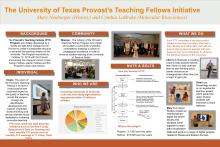Curriculum (Re)design

Pharmacy Practice Labs Promotional Videos
Two promotional videos were created to highlight the impact of Pharmacy Practice Labs and collaboration with UT Athletic Training.
The first video is specifically about the Pharmacy Practice Labs program. In this course sequence, students learn to navigate the pharmacists' patient care process in preparation for Introductory and Advanced Pharmacy Practice Experiences. Students utilize critical-thinking, problem-solving and communication skills to collect, assess, plan, implement and follow-up on patients at introductory and advanced levels.

Objective Structured Clinical Examination (OSCE) Performance Assessment of PharmD Student Pharmacists (AACP)
Dr. Acosta, Dr. Castleberry, and colleagues presented a poster at the July 2023 Meeting of the American Association of Colleges of Pharmacy in Aurora, Colorado. Their poster discussed the relationships between a student’s perceived preparedness before and after Objective Structured Clinical Examinations (OSCEs), OSCE grades, perception of their performance, pre-pharmacy and pharmacy GPAs, composite Pharmacy College Admission Test (PCAT) score, and admission Multiple Mini Interview (MMI) scores.

Designing a Longitudinal Practice Lab Sequence Bridging Education and Practice (AACP)
Dr. Acosta, Dr. Castleberry, and Dr. Davis presented a poster at the July 2022 Annual Meeting of the American Association of Colleges of Pharmacy in Grapevine, Texas. Their poster described the Pharmacy Practice Lab (PPL) sequence spanning all six semesters of the UTCOP didactic program to consolidate lab components and increase skills development while aligning with and reinforcing curriculum balance.

Trauma-Informed Course Auditing Checklist
As part of their PTF initiative's goal of creating protocols and resources to better streamline the creation and regular updating of course materials, Nico Osier created this Trauma-Informed Course Auditing Checklist in Airtable to streamline the process of ensuring their lectures and course materials are responsive to research-backed best practices in trauma-informed teaching. Osier's Auditing Checklist was designed with Nursing and Health Sciences courses in mind, but can be adapted for instructors in virtually any field.

The Perspectives of Three Universities’ Building Information Modeling Course Development (ASEE)
PTF Fernanda Leite co-presented this paper at the American Society of Engineering Education (ASEE) Virtual Annual Conference in June 2020.

Additional Initiative Funding (COLA)
PTF Julia Mickenberg worked with her Graduate Assistant and collaborator, Ricky Shear (Department of English), on a survey of UT liberal arts alumni aiming to find out what alumni valued about their liberal arts degrees and how they felt those degrees limited them. The College of Liberal Arts provided Mickenberg with additional funding in order to broaden the scope of the survey from department-specific alumni to the entire College.

BIM for Design Coordination: A Virtual Design and Construction Guide for Designers, General Contractors, and MEP Subcontractors
PTF Fernanda Leite authored the academic text BIM for Design Coordination: A Virtual Design and Construction Guide for Designers, General Contractors, and MEP Subcontractors. Leite's book includes a chapter specifically about teaching Building Information Modeling (BIM) in college courses titled "BIM Teaching Considerations," which is directly related to the work done in her PTF Initiative.
View the chapter here, or read the summary below.

Integrating an Architectural Engineering Undergraduate Program with Building Information Modeling (Journal of Architectural Engineering)
PTF Fernanda Leite co-authored this article in the Journal of Architectural Engineering. The article examines the integration of Building Information Modeling (BIM) into an undergraduate Architectural Engineering course, which was a core component of Leite's PTF Initiative.
Read the complete paper here, or find the abstract below.
Standardized elements for OCSE
Objective Structured Clinical Examinations, known as OSCEs, are a widely established assessment practice in Pharmacy education. PTF Renee Acosta created OSCE rubrics as part of her PTF initiative to help students gain constructive feedback and more consistent practice of their skills prior to moving on to future courses. Acosta's rubrics that have since been used as the foundation for future PTF projects and other OSCE rubrics used within department.
View the rubrics here.

UT Provost's Teaching Fellows Initiative (Reinvention Collaborative, UERU)
PTF Leaders Cynthia LaBrake and Mary Neuburger presented both a poster and a talk at the 2018 Reinvention Collaborative meeting (now the Association of Undergraduate Education at Research Universities, UERU) on November 8-10, 2018 in Arlington, Virginia. The 2018 Biennial National Conference featured more Undergraduate Vice Presidents/Provosts and more participants overall than any previous Reinvention Collaborative meeting.

